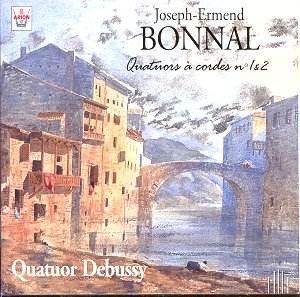 Composer: Joseph-Ermend Bonnal
Composer: Joseph-Ermend Bonnal
Performers: Quatuor Debussy
Record Label: ARION
Number: ARN 68504
Length: 54.39
In this remarkable release by ARION, we are presented with the Quatuor Debussy performing two nuance-filled works of the relatively unsung French composer, Joseph-Ermend Bonnal. String Quartets No.1 (1919) and No.2 (1938) are brought to life with a potent blend of objective understanding of the period-specific nuances, and a subjective eagerness to provide a fresh perspective on these compositions.
Replete with rich textures and fluid progressions, String Quartet No. 1 is a testament to the innovative and forward-thinking nature of its composer. It radiates with vivacity and dynamism; its potent narrative takes us on a reflective journey defined by shifting moods and nimble expressivity. The Debussy ensemble handles the delicate harmonies with finesse, and the authenticity of their performance is reverberating.
Moving onto String Quartet No. 2, the compositional techniques evolved, indicative of the transformative interlude between the two works; a period marked by political unrest, changing socio-cultural norms, and significant advancements in art and music.
The Quartet performs with an acute awareness of these changes, integrating a sense of urgency and transformative energy into their performance. They ensure to portray the gravitas of the time while remaining loyal to Bonnal’s artistic intent.
The recording ambience is quite fitting, providing a gentle warmth to the acoustics and preserving the delicate subtleties of each string instrument. The fidelity and radiance are balanced, making the listening experience immersive while simultaneously respecting the composer’s original vision.
In conclusion, the Quatuor Debussy’s performance of Bonnal’s String Quartets No.1 and 2 manifests as an intimate dialogue, bridging the gap between eras and offering listeners an insightful glimpse into the creative world of this underappreciated composer. Their nuanced delivery, backed by the superb recording quality of ARION, serves as a testament to Bonnal’s deserving place in the pantheon of French chamber music. This record is highly recommended for those interested in expanding their understanding of French musical history beyond its most widely recognized figures.